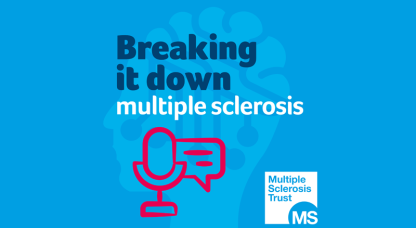If your MS symptoms feel worse at night, you are not alone. Many people find their MS is worse or harder to cope with at night time. It can disrupt your sleep and play havoc with your energy levels, concentration and emotions the next day.
The good news is that many of these MS symptoms can be improved. Talking to a heath professional or making some small changes to your routine could make all the difference.
Read on for ideas for managing some common night symptoms.
Getting up often in the night to wee is called nocturia. It can seriously interrupt your sleep schedule, leaving you feeling overtired the next day.
It's normal to get up once or twice at night, but someone with nocturia might need to get up five or six times a night. Around seven out of ten people with MS have reported this happens to them.
If you need to wee a lot through the day, this can continue at night as well. Your bladder and brain need to co-ordinate when your bladder empties based on how full it is and whether a toilet is handy. MS can scramble these messages and make it harder to tell when you really need to go. It can also stop the flow when your bladder has not fully emptied.
Sometimes nocturia is caused by an untreated wee infection (urinary tract infection, or UTI), or affected by other medical conditions, your age or pregnancy. If your sleep is disturbed for another reason, then you might find you need to get up to wee as well.
Bladder problems like nocturia are often treatable, so first speak to your GP or MS nurse.
Although staying hydrated is important, think about the timing of drinks through the day. Try having your last drink before 8pm, and see whether limiting your caffeine or alcohol intake makes a difference. Caffeinated drinks can irritate your bladder and alcohol can affect your sleep patterns.
Restless legs syndrome causes an overwhelming urge to move your legs, and can feel like your legs are crawling or twitching. It can be intensely irritating and is often worse in the evenings and at night. People with MS are more likely to have restless legs syndrome than other people.
Restless legs syndrome can be associated with iron deficiency, kidney issues or with pregnancy. Some neurologists believe that the underlying cause could be down to how your body processes a signalling chemical called dopamine. For many people with restless legs syndrome, there is no obvious cause. Some drugs prescribed for MS symptoms may make restless legs syndrome worse.
For mild cases, you might find that small lifestyle changes can help. These include exercising during the day, developing a regular sleep schedule, and avoiding caffeine and alcohol late in the evening. Some people find that magnesium spray on the legs can help.
For more persistent cases, speak to your doctor. They can investigate whether you have any nutritional deficiencies or other causes and review your medication.
If you experience muscle spasms or stiff muscles (spasticity), you'll know that getting comfortable enough to sleep can be tricky. Your body or limbs might twist or jerk, which can affect your bed partner's sleep too. Spasms and spasticity can cause pain and make it difficult to move yourself in bed. With less distractions, you can become acutely aware of these problems during the night.
If this is an issue for you, then it could be worth reviewing your sleeping position and checking that your mattress is comfortable. By using pillows or foam wedges for support, you can get your body into a position where your muscles are less likely to stiffen up or spasm. Sleeping with a pillow under your knees, or resting on one side may make a difference. An occupational therapist may be able to help.
If you take medication for your muscle stiffness or spasms, then try to take it around 30 minutes before you go to sleep, so that it is working best when you need it to.
A bad night's sleep can make pain feel harder to cope with, but pain can also make it harder to sleep well. This vicious cycle can be hard to escape.
Pain in MS can have many different causes, from problems with your posture to altered nerve sensations. Ask your MS nurse or doctor whether there are options to help you manage your pain. They could review your medication, refer you to a pain management clinic, or support you to use complementary therapies to improve your situation.
Some drugs used in MS can affect your sleep. People taking the beta interferon disease modifying drugs (Rebif, Avonex, Plegridy, Extavia and Betaferon) sometimes report that taking these drugs can make it harder to get to sleep and stay asleep. These drugs may have side effects including headaches or fever and so people are advised to take them in the evening so they can sleep through the side-effects. If you are taking a beta interferon drug, and you find the other side effects are tolerable, you may prefer to take the drug earlier in the day, so your sleep is less affected.
There is little recent research data on the impact of other disease modifying drugs on sleep, although people taking natalizumab (Tysabri) sometimes report that it improves their sleep patterns. Some drugs for treating pain or spasticity in MS, such as gabapentin or cannabis-based medicines, can promote better sleep because they reduce the symptoms that might get in the way of a restful night.
Worry can keep you awake, and living with stress can affect your sleep.
If you are able to resolve the stressful situations, you should find it easier to sleep again. However, when stressful circumstances are beyond your control, mindfulness or relaxation exercises can help you put this in context. So can talking things over with a trusted friend, relative or mental health professional. They may help you spot issues that you can resolve or encourage you to think about things in a different way.
If your head is racing with things you don't want to forget, consider keeping a notepad by the bed and writing down your thoughts. Then you'll know they are safe there for the morning when you can deal with them more easily.
Of course, you may well experience more than one of the issues above. They can all interact with each other, and untangling them can take some time and patience.
If you're kept awake by spasms or pain, or woken up by nocturia, you would not be surprised to be tired or fatigued the next day. As a result, you might have less energy for tasks, socialising or exercise. It doesn't take much for this to become overwhelming or to bring your mood down.
Many night symptoms can be improved with support from your health professionals, so don't be afraid to let them know. Your GP or MS team can review your medication and help you manage other MS symptoms that are interfering with your sleep.





